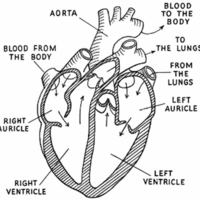Circulatory System
Dublin Core
Title
Description
The circulatory system includes the heart, blood, and a huge network of blood vessels that carry blood all over the body. The job of the circulatory system is to deliver oxygen to cells all over the body and then to carry out waste product like carbon dioxide.
The heart is an organ made out of muscle. It’s job is to pump blood through the body. The heart has four main sections or chambers:
Right atrium
Right ventricle
Left atrium
Left ventricle
Blood flows into the right atrium through two large blood vessels called the superior vena cava (from the upper body) and the inferior vena cava (from the lower body). From there blood moves to the right ventricle. It then travels to the lungs to get oxygen.
Blood coming back from the lungs enters the left atrium and then into the left ventricle. From there it leaves the heart through the aortic valve and goes into the aorta. This is the largest artery in the body, and it leads to all parts of the body.
There are many kinds blood vessels that carry blood around the body. Arteries carry blood away from the heart. (You can remember arteries and away.) Veins carry blood back to the heart.
Blood that is coming from the lungs has lots of fresh oxygen in it and is bright red. After the oxygen is delivered to cells and carbon dioxide is picked up, the blood is darker colored.
Blood is made up of a liquid called plasma and three kinds of cells. Red blood cells carry oxygen to the various parts of the body. White blood cells help fight disease. Platelets help blood clot.
The heart is an organ made out of muscle. It’s job is to pump blood through the body. The heart has four main sections or chambers:
Right atrium
Right ventricle
Left atrium
Left ventricle
Blood flows into the right atrium through two large blood vessels called the superior vena cava (from the upper body) and the inferior vena cava (from the lower body). From there blood moves to the right ventricle. It then travels to the lungs to get oxygen.
Blood coming back from the lungs enters the left atrium and then into the left ventricle. From there it leaves the heart through the aortic valve and goes into the aorta. This is the largest artery in the body, and it leads to all parts of the body.
There are many kinds blood vessels that carry blood around the body. Arteries carry blood away from the heart. (You can remember arteries and away.) Veins carry blood back to the heart.
Blood that is coming from the lungs has lots of fresh oxygen in it and is bright red. After the oxygen is delivered to cells and carbon dioxide is picked up, the blood is darker colored.
Blood is made up of a liquid called plasma and three kinds of cells. Red blood cells carry oxygen to the various parts of the body. White blood cells help fight disease. Platelets help blood clot.
Contributor
Cut Rita Zahara
Rights
Creative Commons
Type
Files
Collection
Citation
“Circulatory System,” Open Educational Resources (OER) , accessed January 23, 2026, https://oer.uinsyahada.ac.id/items/show/767.


